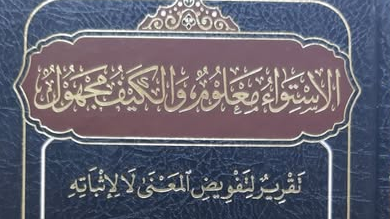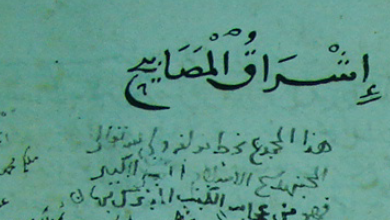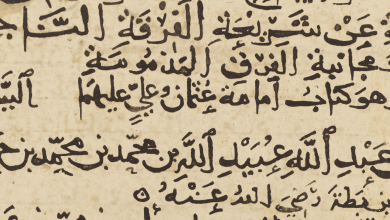Mar’ī al-Karmī al-Ḥanbalī (d. 1033 AH) on the Ottoman Rulers, Their Authentic ‘Aqīda (creed) and Madhhab
The text presented here is a translation from the Arabic work “Necklaces of Pure Gold Regarding the Virtues of the Ottoman Dynasty” [Qalāʾid al-ʿIqyān fī Faḍāʾil Āl ʿUthmān], authored by the renowned Hanbali scholar Imam Marʿī al-Karmī al-Ḥanbalī (d. 1033 AH/1624 CE), with verification and commentary by the Syrian editor, Muḥammad Wāʾil al-Ḥanbalī.
Al-Karmī, a notable admirer of Ibn Taymiyya, demonstrated in this work a remarkably balanced approach to Islamic governance and history. The translated passages reveal his fair assessment of the Ottoman dynasty, praising their adherence to Sunni orthodoxy. This balanced perspective stands in stark contrast to certain trends in recent Salafism that have expressed hostility toward both the Ottoman Empire and the Hanafi legal school that was predominant throughout Ottoman territories.
The text highlighted the religious virtues of the Ottoman sultans while comparing them favourably to previous Muslim dynasties, including some Abbasid caliphs who endorsed Muʿtazilite doctrines and the Fatimids whom he criticized severely. Al-Karmī’s appreciation for the Ottoman commitment to defending Ahl al-Sunna wa al-Jamāʿa reflected a scholarly impartiality often absent in contemporary sectarian discourse.
These translations provide valuable historical context for understanding traditional scholarly attitudes toward the Ottoman caliphate, demonstrating that some respected Hanbali scholars recognized the religious legitimacy of the Ottoman dynasty despite differences in legal school affiliation.
Translation from p. 104:
حسن عقيدتهم وأنهم من أهل السنة الذابين عنها
The excellence of their creed and that they are among the People of Sunna (Ahl al-Sunna) who defend it
ومن فضائل سلاطين بني عثمان
Among the virtues of the Ottoman sultans:
حسن العقيدة، وارتكاب الطريقة الناجية الحميدة، جارين على سنن مذهب أهل السنة والجماعة (٢)، مُقتفين
لطريقة أهل الحق مع السمع والطاعة.
Excellence of creed (aqīda), and adherence to the praiseworthy, salvific path, following the ways of the doctrine of the People of Sunna and the Community [Ahl al-Sunna wa al-Jamāʿa] (2), emulating the methodology of the people of truth (Ahlul-Haqq) with hearing and obedience.
ذابين عن مذهب أهل السنة بالسيف والسنان، قامعين أهل الضلال مقتدين بمذهب أبي حنيفة النعمان (۳).
Defending the doctrine of the People of Sunna with sword and spear, suppressing the people of misguidance, following the school of Abū Ḥanīfa al-Nuʿmān (3).
فلم ينقل عن أحدٍ منهم سوء اعتقاد، بل يكرهون أهل الزيغ والإلحاد، بخلاف غيرهم من الخلفاء والملوك، فقد داخل كثيرًا منهم الأوهام والشكوك، وعَرَجُوا عن طريق الاستقامة، فباؤوا بالخسر والندامة.
No offensive belief (i’tiqad) has been reported from any of them; rather, they despise the people of deviation and heresy, unlike other caliphs and kings, for many of them were infiltrated by delusions and doubts, and they deviated from the path of righteousness, thus incurring loss and regret.
هذا المأمون بنُ الرشيد هارون وناهيك به كان معتزلياً، وهو أَوَّلُ مَن أظهر القول بخلق القرآن، وأذلَّ العلماء في شأن ذلك وأهان، ونصر مذهب أهل الاعتزال، وفتح على الناس باب الجدال، وكان يجمع العلماء بداره، ويُحاججهم ويُناظرهم، فيقطعهم في المناظرة ويفوق عليهم.
This al-Maʾmūn, son of Hārūn al-Rashīd—and that suffices you about him—was a Muʿtazilite, and he was the first to publicly proclaim the doctrine of the creation of the Qurʾān, and he humiliated and dishonoured the scholars regarding this matter, and supported the doctrine of the Muʿtazilites [Ahl al-Iʿtizāl], and opened the door of argumentation for the people. He used to gather scholars at his residence, debate and engage them in disputation, defeating them in debates and surpassing them.
—————
Footnotes:
(۲) ونقل هذا الكلام – في معتقد آل عثمان – شهاب الدين أحمد بن محمد الحموي الحنفي (ت ۱۰۹۸هـ) في كتابه: «فضائل سلاطين بني عثمان (ص) (۱۲۲)، وكذلك مُدرِّسُ المسجد النبوي العلامة عبد القادر شلبي (ت ١٣٦٩هـ) في كتابه: الدرر الحسان في فضائل سلاطين آل عثمان» (ص۳۲).
(2) This statement—regarding the creed of the Ottoman dynasty—was transmitted by Shihāb al-Dīn Aḥmad ibn Muḥammad al-Ḥamawī al-Ḥanafī (d. 1098 AH) in his book: “Virtues of the Ottoman Sultans” [Faḍāʾil Salāṭīn Banī ʿUthmān] (p. 122), and likewise by the teacher of the Prophet’s Mosque, the greatly learned scholar ʿAbd al-Qādir Shalabī (d. 1369 AH) in his book: “The Beautiful Pearls Concerning the Virtues of the Ottoman Sultans” [Al-Durar al-Ḥisān fī Faḍāʾil Salāṭīn Āl ʿUthmān] (p. 32).
(۳) انظر : ما سيأتي في التتمة الحادية عشرة (ص۱۹۹).
(3) See: what will come in the eleventh appendix (p. 199).
————–
Translation from p. 105:
وتبعه على مذهبه الحائد، واعتقاده الفاسد المعتصم بالله، ثم الواثق بالله، وراج في زمنهم مذهب الاعتزال، مذهب أهل الباطل والضلال، إلى أنْ رَفَعَ اللهُ عن الأمة هذه الغمة بالخليفة المتوكل على الله، فضلًا ونعمةٌ مِنَ اللهِ، فَأَكرمَ أَهْلَ السُّنَّة، وعظمت به عليهم المنة ، لكنه كان – كما قيل – ناصبيا، يكره الحسن والحسين وعليا، وكان الخليفة الناصر لدين الله شيعيا.
Al-Muʿtaṣim Billāh followed him in his deviant doctrine and corrupt belief, then al-Wāthiq Billāh, and the Muʿtazilite doctrine—the doctrine of falsehood and misguidance—flourished during their time, until Allah lifted this distress from the nation through the caliph al-Mutawakkil ʿalā Allāh, as a favour and blessing from Allah. He honored the People of Sunna, and his favour upon them was great, but he was—as it was said—a Nāṣibī who despised al-Ḥasan, al-Ḥussain, and ʿAlī, while the caliph al-Nāṣir li-Dīn Allāh was a Shīʿite.
وأما أوائل خلفاء بني العباس : الأمين فالرشيد، فالهادي فالمهدي، ومن قبلهم، فلم يُنقل عن أحد منهم سوء عقيدة بحمد الله تعالى.
As for the early Abbasid caliphs: al-Amīn, al-Rashīd, al-Hādī, al-Mahdī, and those before them, no bad creed (aqīda) has been reported from any of them, praise be to Allah the Exalted.
وكذلك خلفاء بني أمية بأجمعهم، فلم يثبت عن أحدٍ منهم سوء اعتقاد، وإن كان كثير منهم قد ارتكب المُهملات والفساد، وبعضُهم للإمام علي وأهل بيته ليس هو من حيث العقيدة التي يُدانُ الله تعالى بها، بل من حيث الخلافة والتنافس في الرئاسة.
Likewise, all the Umayyad caliphs, none of them was proven to have bad creed, even though many of them committed negligence and corruption, and the animosity of some of them toward Imam ʿAlī and his household was not from the perspective of creed by which one worships Allah the Exalted, but rather from the perspective of the caliphate and competition for leadership.
وأما خلفاء مصر الفاطمية – ويُسمّيهم أهل العلم : العبيدية؛ نسبة لجدهم عبيد الله المهدي (۱) ؛ لأنهم ليسوا بأشراف حقيقة بل ادعاء – فكانوا والعياذ بالله تعالى في غاية ما يكون من سوء الاعتقادِ والزندقة والإلحاد، يتجاهرُونَ بسب الصحابة، ويكتبونه على أبواب المساجد وحيطان الشوارع، وكان مناديهم يُنادي بين القصرين بالقاهرة: «مَن لعن وسب فله دينار وإرْدَب .
As for the Fatimid caliphs of Egypt—whom the scholars call: the ʿUbaydiya, in relation to their ancestor ʿUbayd Allāh al-Mahdī; because they are not truly nobles but merely claim to be—they were, Allah the Exalted protect us, at the utmost extreme of bad creed, atheism, and heresy, and would publicly curse the Companions and write these curses on the doors of masjids and street walls. Their herald would announce between the two palaces in Cairo: “Whoever curses and insults will receive a dinar and an irdab.
——————–
Let us see what was mentioned by Shaykh ʿAbd al-Qādir Shalabī (d. 1369 AH) in his book: “The Beautiful Pearls Concerning the Virtues of the Ottoman Sultans” [Al-Durar al-Ḥisān fī Faḍāʾil Salāṭīn Āl ʿUthmān] (p. 32):
ومن فضائل سلاطين آل عثمان : سلوكهم في العقائد الدينية مذهب أهل السُّنَّة، ومجانبتهم البدع والأهواء، ومحاذرتهم الغي والإغواء، فلن ترى أحدا منهم إلا وتجده من أحسن الناس دينا وأقواهم يقينا، متحليا بحلى الهداية، متجافيًا عن وصمات الغواية. وهذه نعمة سابعة ومِنَّةٌ بالغة، لم يفز بها كثير من الخلفاء الذين أُشْرِبَت قلوبهم محبّة الأباطيل والأهواء، حتى ضلت منهم الأحلام، وقارعتهم أَسِنّة المَلام، فكانوا سِيرًا في السلف، وعِبَرًا في الخلف.
“Among the virtues of the Ottoman sultans: their adherence in religious doctrines to the school of the people of Sunna [Ahl al-Sunna], their avoidance of innovations and capricious desires, and their caution against error and seduction. You will not see any of them except that you find him among the best of people in religion and strongest in certainty, adorned with the ornaments of guidance, distancing himself from the stigmas of deviation. This is a seventh blessing and an abundant favour, which many caliphs did not attain—those whose hearts were infused with love for falsehoods and capricious desires, until their aspirations went astray, and they were afflicted by the spearheads of blame. Thus, they became tales among the predecessors and lessons for the successors.”
Additionally, the following from pp. 153-154 of Qalāʾid al-ʿIqyān fī Faḍāʾil Āl ʿUthmān:
The Author’s Response to Those Who Deny Mentioning the Virtues of the Ottoman Dynasty
Among the virtues of the Ottoman sultans:
Their possession of these excellent qualities in times such as these, in which corruption has become entrenched and has appeared on land and sea and among the people, and in which the condition of scholars, judges, and worshippers has deteriorated, and the one who holds fast to his religion is like one grasping a live coal, and the believer cannot find an assistant in goodness and reward.
Some deniers have objected to what I have presented regarding the virtues of the Ottoman sultans, despite the virtues they possess which none would deny except every stubborn, spiritually dead person. And they forgot his saying, peace and blessings be upon him, as reported by the two Shaykhs (1): “Charity is obligatory upon every Muslim.” It was said: “What if he finds nothing [to give]?” He said: “He should work with his hands, thereby benefiting himself and giving charity.” It was said: “What if he cannot?” He said: “He should help the distressed person in need.” It was said: “What if he cannot?” He said: “He should enjoin what is good or (2) righteous.” It was said: “What if he does not do that?” He said: “He should refrain from evil, for that is charity for him.”
To this meaning, al-Mutanabbī (3) alluded in his poetry:
“We are in a time where abandoning the ugly [deeds] is considered, from most people, a favour and virtue.”
Look, O human: in which centuries and times are you?! A time that has passed the tenth century, and in which the immoral person and the tax collector (1) have advanced, while the skilled and proficient have regressed, and the grateful rich and the patient poor have become few.
None who claims knowledge thrives in it except every deficient pretender, or ignorant fool, or one who possesses magnificent clothes, long sleeves, terrifying garments, and trailing hems, or a turban like a tower, and sleeves like a saddlebag. He repels the questioner with his foolishness and companions, and deludes the ignorant with the loftiness of his position and the abundance of his books. He passes time with laughter and jokes, or lengthy silence mixed with awe. If he tells a story, he tells an obscene one, or if he recites, he recites a grammatically incorrect poem, or if he presents an issue, he presents it with unintelligible nonsense and incomprehensible discourse.
Yes, he has mastered backbiting and perfected it, and his soul has enticed him to delve into the honour of the elders and their judgment. Whatever good and blessing, or joy and mercy that has come in this time is contrary to analogy, and whatever calamity befalls you is due to what your hands have earned, O assembly of people. And as you are, so will those who rule over you be, whether of gentle heart or harsh. If the subjects were righteous, their rulers would be righteous, and if they stood firm on the [straight] path, it would be made straight for their ruler (2).
Footnotes:
(1) Sahih al-Bukhari (8/11), Sahih Muslim (2/699).
(2) What is established is from manuscript (b), and it conforms to the hadith sources.
(3) See: “Diwan al-Mutanabbi” (p. 490).
(1) What is meant by “al-ʿāshir” here: one who takes people’s wealth. See: “Mukhtār al-Ṣiḥāḥ” (p. 209).
(2) In manuscripts (a) and (b): “the righteousness of their rulers” and “the straightening for their ruler.”
(3) “We will be fair to you” is an addition from manuscripts (a) and (b).
Compiled by:
Abul Hasan Hussain Ahmed
10-4-25/Shawwal 1446 AH






